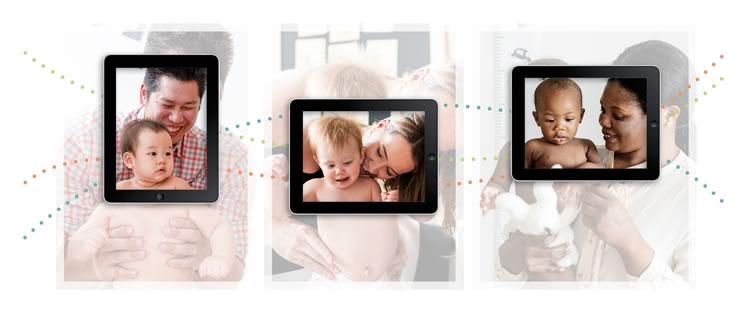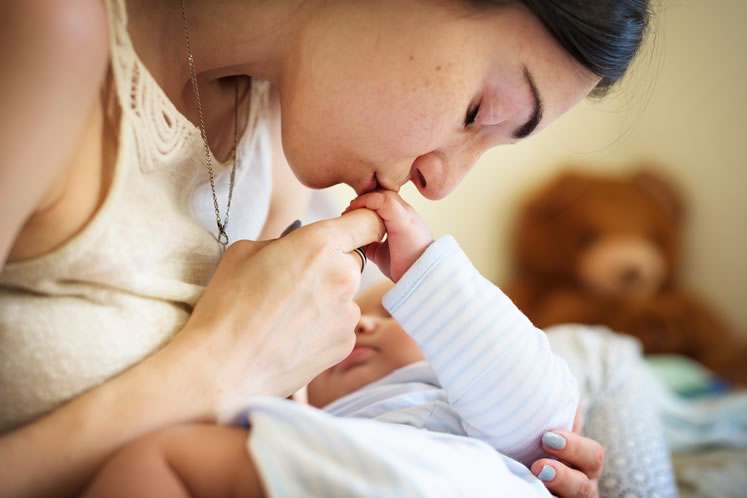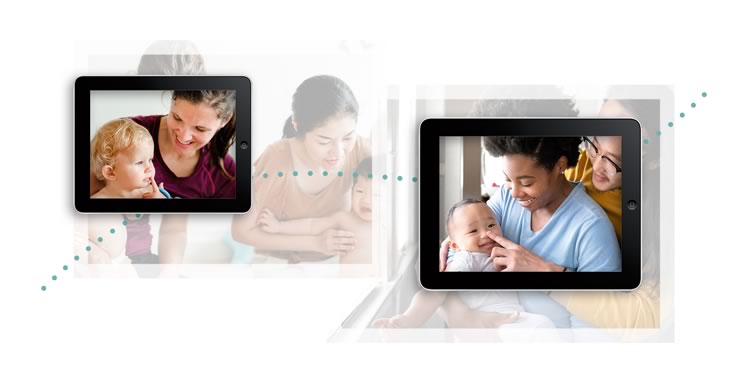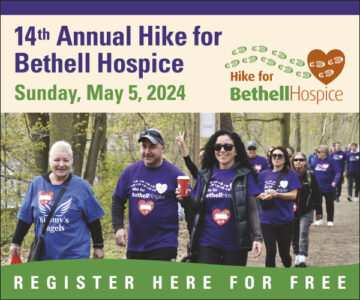It Takes a Virtual Village
In what could have been a lost year for isolated new parents and their babies, social agencies moved their tried-and-true community meetups and support groups online.
“Zoom, zoom, zoom, we’re going to the moon,” sings Kelly Rumney, a facilitator at the Caledon Parent-Child Centre in Bolton. From her home in Tottenham, she’s leading a song and rhyme session for infants and their parents – virtually, that is.
“I sure miss doing these with participants!” she says, squeezing the imaginary baby on her lap. As she scans the screen, she sees a familiar face and says to new mother Emma, “Wow! What a big change in one week! He’s so alert.” Emma goes on to talk about the typical struggles of getting herself and a new baby out the door for groceries and errands.
Except, at this point in history, parenting is anything but typical. New parents, already navigating the ups and downs of sleepless nights and emotional swings while scrambling to hone their parenting skills, are also coping with a public health crisis. So to the usual tensions, add isolation, restrictive lockdown rules and heightened stress levels. The temporary closure of parent-child centres, community centres and church basements that host free community-based programs for new parents is a major loss. But nonprofit agencies such as the CPCC, founded in 1987, are throwing everything they’ve got at making a virtual go of it.

“The whole Covid experience has had a profound effect on young families and those that are dealing with pregnancy, birth and the first year of a baby’s life,” said Shelly Sargent, who manages the CPCC’s community relations and volunteers, during a Skype interview. All eight CPCC sites in Caledon are designated locations for the provincially funded programming offered across Ontario by EarlyON Child and Family Centres.
Over the course of the pandemic, staff for providers such as the CPCC, like many newly remote workers, have switched to digital drop-in programs and support groups via services such as Zoom. Some facilitators offer daily and weekly virtual programs that focus on infant playtime and storytime for parents and babies. The CPCC’s Infant Mother Goose Plus, for example, is a new offering that features a combination of English, Hindi and Punjabi songs. Other facilitators lead discussion groups that encourage parents to talk about issues relating to developmental milestones, feeding, sleeping and infants with special needs, as well as their own emotional needs. At the CPCC, this means more than 20 virtual sessions over the course of a five-day week. Staff are also available to respond to personal questions and to help with referrals to other services.
“If I could say one thing to new parents, it would be that you’re not alone,” said CPCC program manager Ailsa Stanners-Moroz. “We need our village more than ever and the village hasn’t gone anywhere. We’re here and we’ll embrace you.”
The hope? These virtual connections will undergird real-life liaisons that will resume in time. Early signs indicate that this is, indeed, starting to happen. Lindsay Cowan, supervisor of EarlyON programs in Wellington County, including in the town of Erin, has witnessed how new moms are bonding over a historic experience that sets them apart not only from peers with older children, but also from women who will give birth post-pandemic. “We notice participants in our infant programs starting to build new relationships with others in their community,” Cowan wrote in an email message. “Many of these new mothers gave birth in 2020, which provides them with a unique connection they share and can relate to together.”
Laurie Rooney is supervisor of children’s services for Dufferin County, which operates EarlyON sites in Orangeville, Grand Valley and Shelburne, with plans to expand the programs to other communities. Rooney’s department has been running a slate of online offerings including casual coffee chats promoted on its Facebook page. She believes the pandemic has thrown the value of these services into sharp relief.
“I think when people are able to come back [to in-person programs], we will have a fresh outlook on how we do things, what support looks like, and how valuable human connection is,” she wrote in an email. “This will be more of a focus than ever – allowing time and space for connection, not so much education about a topic, but opportunity to enjoy the company a community brings.”
Forming ties
College professor Rosana Fialho has been leaning heavily on Caledon and Dufferin County EarlyON virtual programs since her daughter Emilia’s birth last July. With her parents out of province and her husband’s family out of the country, she said the programs offer a lifeline for new parents during these strange times.
“EarlyON has stepped in to help with the things that we can’t do because of Covid. Helping us meet other moms by singing songs, helping us keep our babes entertained and interacting with people, even if it’s just online,” said the Orangeville mom. “A critical factor moms are missing right now is connection, and the CPCC is really taking great strides to help us with that. I wouldn’t have been able to do this without them.”
Last fall, when EarlyON centres were briefly open for in-person programs, said Fialho, staff did a fantastic job of quickly shifting again, in a way that helped parents feel very safe in the facility. Fialho attended an infant massage program that had staggered start times and small numbers. “My baby could see other babies, and face-to-face conversation felt so great for me,” she said.
A key moment for Fialho came when Caledon program manager Stanners-Moroz asked her, “What are you most worried about?” No one had asked that before. For Fialho, a huge concern was that, aside from her and her husband, Vicente, and a few healthcare providers, no one had yet held her daughter. She also wondered what will happen when it’s time to find a daycare provider and she can’t even take an in-person tour of the facility.

Rooney agrees that by the time daycare starts for these pandemic babies, families may be dealing with underdeveloped social skills and heightened separation anxiety. “Programs and activities will be provided to help these families build these skills,” she wrote.
Each CPCC EarlyON virtual session is currently attended by about six to eight families, says facilitator Aly Kapoor, who acknowledges that creating an online sense of community so fast was a challenge. “It was a bit bumpy. There was a lot of fear at first,” she says. “It takes a while to gain a level of trust with each other.”
Staff incorporate icebreaker questions to give parents an opportunity to share how their day is going and to keep them engaged and active in the discussions. Facilitators also try to go quiet at times – to mimic the in-person experience and give parents an opportunity to talk among themselves.
In the CPCC’s virtual programs, staff include extended family in the fun for both practical and emotional reasons. Grandparents, for example, are encouraged to join the classes so they can witness those fleetingly precious moments they miss because they can’t visit their grandkids in person. Older siblings are also welcomed, making it easier for parents to keep them engaged and active during sessions.
In addition to one or two facilitators and a behind-the-scenes technical staffer, the virtual sessions may be attended by an EarlyON resource consultant, who offers parents phone or email support to answer questions or connect them with other services they may need.
And virtual programming goes beyond screen time. Facilitators also create simple off-screen activities for parents to incorporate into their day, and the intention is always to use what participants have at home. One of the CPCC’s most popular programs has been Exploring the Great Outdoors, which suggests an outdoor family activity, such as gathering found objects while out walking, then using the objects to create, for example, a collage. Later in the week, the family and facilitators meet virtually to review their experience and share what worked and what they learned.
Getting the word out
Before Covid, parents would find out about these groups and programs through word of mouth, including staff members’ own efforts at striking up helpful conversations in public. Stanners-Moroz, for example, would often encounter expectant or new mothers in the grocery store and invite them to visit the Bolton site if they hadn’t heard of it, direct them to another spot in the Caledon EarlyON network (two more locations, in Caledon East and Southfields, will open when restrictions lift), or to another EarlyON network if they lived outside of Caledon.
Unfortunately, those spontaneous encounters have mostly disappeared, as expectant and new mothers are trying to stay safe at home. “When was the last time you saw a baby in the grocery store?” asked Stanners-Moroz.
One of the consequences of this isolation, said both Sargent and Stanners-Moroz, may sound subtle: many women struggle with having no witness to their pregnancy. Mom Fialho said that she expected to “become part of that social sisterhood of pregnancy,” but instead, many people, such as her college students, were seeing her only from the shoulders up on a video call and didn’t necessarily know she was pregnant.
In addition, most prenatal appointments now take place virtually, or if in person, exclude a partner. And all the typical rites of passage, such as baby showers and celebrations, simply aren’t happening. Clinical counsellors say expectant and new mothers who miss these events and acknowledgments may be experiencing grief from accumulated “micro losses.”
Planning a birth during a pandemic has also proven to be a logistical nightmare, as hospital rules and regulations change constantly. “Everything had a next layer of concern and uncertainty,” said Fialho. Unsure whether she would be required to wear a mask during labour or if her husband could be in the room with her, she planned a homebirth to mitigate some of the variables. When the time came, she experienced some minor complications and delivered at Headwaters Health Care Centre, unmasked and with her masked husband by her side.
Many new mothers are also navigating the challenges of breastfeeding with little or no support available. “Most new mothers need a little help with breastfeeding,” said Faith Flatt, a naturopath, doula and lactation educator at Village Naturopath in Orangeville. (Flatt is also my sister.) “Especially now,” she continued, “many mothers are completely on their own, doing online research about complicated nursing holds, and feeding schedules, and they’re being overwhelmed.”
A lactation consultant or educator is a valuable resource for mothers who need reassurance and help with positioning and pumping, not to mention kind words and encouragement. But during lockdown, consultants have been unable to do in-person visits, often leaving mothers to learn the ins and outs of breastfeeding under tough, lonely conditions.
Research published last June in Frontiers in Global Women’s Health noted that just a few months into the pandemic, the number of pregnant and postpartum participants who reported feeling depressed and anxious was sharply higher than before the pandemic. Titled “Moms Are Not OK: Covid-19 and Maternal Mental Health,” the study found that nearly 41 per cent of participants experienced depression and 72 per cent reported symptoms of anxiety as the pandemic set in.
“I’m seeing a lot of anxiety, marital problems, depression, and grief,” says Amaranth psychotherapist Karen Dougherty. “New parents are thinking, ‘This is not how things were supposed to be.’” Dougherty believes there will be a great deal of research down the road on “pandemic babies,” who received so much focused attention from their parents in their infancy but lacked socialization with other babies.

Still, the therapist points to an explosion in virtual therapy, including in her own practice, as one silver lining of these times. “Many more people now have access and, frankly, more time, given they do not need to commute there and back.”
EarlyON Centres in Dufferin are trying to take preventive measures for vulnerable expectant and new mothers. Rooney wrote that staff are currently enrolling nearly every new mom they encounter in one of their support groups or offering other supports and resources to reduce the burden. And teams throughout Headwaters insist that no matter what a new mom needs, an extensive network of community resources can help.
Organizations have provided porch drop-offs of lasagna dinners, food boxes, supplies and even craft kits. From infants and mothers with special needs to those with worries about food insecurity, said Sargent, “If the CPCC can’t help you, we can find someone who can. The local social safety net is real and we’re all here to help.”
Mom Fialho can attest to how powerful these connections have been for her. They have not only helped her cope, but she is also paying it forward by sharing with others what she’s learned about the benefits of exercise in lifting her mood. Her experience is borne out by the “Moms Are Not Okay” study which found a much lower rate of depression and anxiety among participants who engaged in at least 150 minutes of moderate physical activity every week. On Zoom, Fiahlo now leads a group of new mom friends in a twice-weekly drop-in “baby-wearing” dance class, often to lively Latin rhythms. “I always feel so much better after I’ve been physically active,” she said.
Sargent acknowledged that some people continue to feel a sense of stigma over asking for help, adding that families who struggle financially have been the hardest to connect with. She offered these reassuring words: “A quick phone call to us doesn’t tie you to anything or put you on any list. If you need some help, we’re here to talk.”
At the end of our Skype meeting, Sargent touched on a broader reason the agency’s work with new parents is so meaningful, especially during times of uncertainty: “Babies are a message to us all that we’re going to go on.”
More Info
Screen times
Are you an expectant mom or new parent in Headwaters? Here’s where to meet other parents and connect with community resources.
EarlyON Child and Family Centres
EarlyON Centres offer free, engaging, quality programing for families and children from birth to age six. Families can attend activities such as reading, sing-alongs and special events. Parents can seek advice from professionals trained in early childhood development, as well as attend workshops to help them navigate all stages of their child’s early growth. The centres provide a safe and inclusive place to make connections with other families with young children and to help families who need to access other support services within the community.
Dufferin
EarlyON offers programs such as Feelings after Birth and Come Understand Parenting. Call or text Dufferin EarlyON at 519-938-0559 or check their Facebook page for up-to-date program options and special events.
Erin
EarlyON includes offerings such as Circle Time and Mother Goose Rhymes. For more information about EarlyON and other support services, visit the Community Resource Centre of North and Centre Wellington, or call 519-843-7000 or email program supervisor Lindsay Cowan at [email protected].
Caledon
The Caledon Parent-Child Centre operates EarlyON programs such as Baby Play Time, Baby Chat and Shake Rattle & Roll, as well as Let’s Get Together for parents of babies with special needs. For current listings, go to the centre’s online calendar. You can also call 905-857-0090 or email [email protected].
Related Stories

Spring Contributors
Mar 31, 2021 | | ContributorsMeet three of the creative folks – Johanna Bernhardt, Anthony Jenkins and Kim van Oosterom – who make this issue shine.










